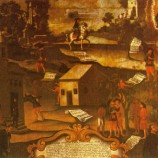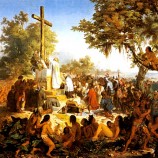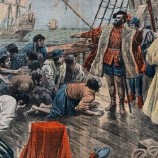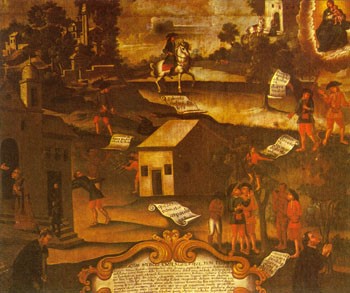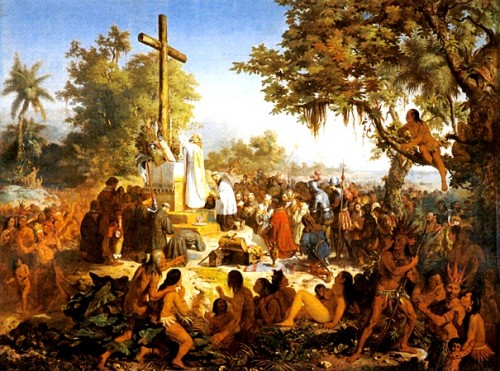Priesthood and Politics – Part 3 – Risks and Opportunities
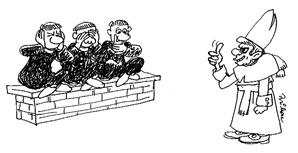
In this electoral process of 2012, many bishops have already announced the sanctions of priests who defy the institution for presenting their names to community choice, becoming candidates for an elective office. This reveals a closed-mindedness of the church as an institution. To suspend the priestly ministries of those priests running for political office, while tolerating professional politicians who use the ecclesial communities to seduce the people is contradictory. There are priests who are also lawyers, school directors, professors, blue-collar workmen. Why can’t a priest assume a political position? It is absolutely questionable the ethical principal that states: “In order to not divide the community, priests should not become political candidates, not indicate candidates, and should not position themselves politically.” But many times the precognizant unity is but a ritual and apparent; it is not a real unit, as they continue to commune at the Eucharist table among those solidary with the oppressed, shoulder to shoulder with people who, in day-to-day life, are fixed into structures of oppression.
If a priest takes up a political position, he runs the risk of losing some of his faithful, but the community would gain in quality. Attitudes such as this among the ecclesiastic institution only serve to make explicit the internal divisions within the community and bring to the surface other options that deny the evangelical stance. A large part of the elected in our addicted democracy coopted by the economic powers, buy the right to represent the people and do not become their legitimate representatives. In this sense, priests in politics could contribute to raising awareness and to change this pseudo model of conducting politics. The priestly ministry is not restricted to the internal ambit of the church, but, quite exceptionally, for the lack of better representatives, God’s army may be included in public administration.
Notably in small municipalities across the country in recent history, many priests actively participated in party politics, serving mandates in the executive and legislative arena, and have left behind many contributions for the improvement of the people’s lives and for the development of communities. In the end it is very true that, upon evaluating the conjunction of actions undertaken by priests in Brazilian politics, we cannot forget to consider that a few, perhaps elated by momentary enthusiasm, intoxicated by power or manipulated by professional political groups, let themselves be taken away by unethical conduits and did not maintain a performance at the height of their competence, unable to put into practice the speeches with which they motivated and excited the masses in their election campaigns. Here in the North and Northeast of Minas Gerais more specifically in the counties of Montalvânia, São Francisco, Buritizeiro e Bonfinópolis de Minas, where four priests were elected governor in recent elections, one such individual has been and continues to fall out of the position under pressure of the judicial powers, accusing him of administrative improbity. Cases like this one also occur with other bureaucratic priest in other corners of the country and should be criteriously analyzed and never generalized. Too many times, tangled in non-ethical paths and for making administrative mistakes, these citizens were lacking the required preparation, the guile and the perception of a reality present in the addicted scenario of our political system where private funding from suppliers and public building contractors is fundamental for financing political campaigns and, in the attempt to justify the dirty means by the nobility of their purpose, they unwarily fall into subtle traps, thus becoming involved with racket operators that have nothing to do with the political ideals that motivated their campaign in the first place. I am reminded of the matuto saying: “Who makes the candy wipes the pan. Who wipes the pan licks his fingers.”
The greater majority of priests serving political mandates have conducted serious, responsible and committed administrations with the people’s cause. Many of these high priests continue to love the priestly ministry and give an admirable testimony of commitment amidst the rottenness of partisan politics. The performance of the priesthood is indeed qualified. Many times their withdrawal from the priestly ministry occurs due to the lack of support from the Church itself, which often abandons them, excluding them from ecclesial and pastoral involvement.
Considering that the mainstream media is linked in its interests to the economic oligarchies, which manipulates more than it informs, the obligation of priests in politics contributes to assist the people in discerning which project to support and who to vote for. The best candidates in the ethical sense are usually the ones who have the least to invest in election campaigns. As citizens, we have responsibilities, rights and duties. If priests in politics are really committed to social emancipation and assume a political stance, whether by supporting names for the elections or becoming candidates themselves, they are truly contributing to God’s design, through the choice for a better quality of life and building a more just, ethical and fraternal society.
The human person is by nature a political being; everything we do or fail to do is a political attitude and dependent upon politics is the very continuity of life which is God-given free of charge. A liberating biblical spirituality shows us the intimate relationship between faith and politics. There is no contradiction between faith and politics. Authentic faith is intrinsically inherent to the causes of the perpetuation of a fair and dignified life. As disciples and missionaries of Jesus, we must make a difference. We cannot escape the co-responsibility for the growth of a new civilization based on the defense of life, seeking sustainability in a fraternal way. We cannot stand idly by in the face of the structural injustice that is pounding the lives of the larger part of the population. Pope Paul VI reminds us that to conduct politics is the noblest form of expressing love to your neighbor. The Latin American Episcopal Conferences, held in Medellin (Colombia), Puebla (Mexico), Santo Domingo (Dominican Republic) and especially the document of the 5th General Latin American and Carribean Episcopal Conference, held in Aparecida – Sao Paulo in May 2007, also highlights the need for the political participation of Christians, among which are priests.
Related Articles







